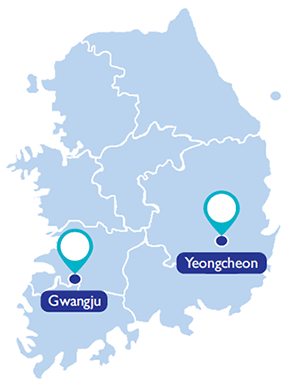Location Report
- Home
- Investment Opportunities
- Sites
- Location Report
Korea’s parts and materials industry is one of the core components of the country’s economy, as it boasts a high level of global competitiveness. Here are two regions in the country that are seeing rapid growth and increasing investments for R&D and manufacturing.
Gwangju Automobile Industrial Valley
At the center of Gwangju City’s efforts
to become a powerhouse of eco-friendly
vehicles lies the Gwangju Automobile
Industrial Valley. The Valley is composed of the Bitgreen National Industrial
Complex, the Jingok Industrial Complex
and the High-tech District in Bukgu.
Currently, a total of 42 companies like
Hyundai Mobis are doing business in
three auto parts clusters in the Jingok
Industrial Complex. Each cluster is in
charge of the modularization of auto parts
and the production of auto parts for clean
diesel vehicles as well as electric vehicles.
R&D institutes are concentrated in the
Chumdan District, including the Gwangju
Institute of Science and Technology
(GIST), Gwangju Technopark and the
Gwangju regional branch of the Korea
Electronics Technology Institute (KETI).
The Bitgreen National Industrial
Complex will serve as a focal point of the
Valley. The new complex will be as wide
as 4.13 million square meters and will
border both Gwangsan-gu, Gwangju and
Hampyeong-gun, Jeollnam-do. The
Korea Land & Housing Corporation was
assigned as project manager and will cre-
ate a complex exclusive to the automobile
industry. The area will house the auto
parts manufacturing cluster, the techno-
logical support center and the global busi-
ness center. In particular, the technologi-
cal support center will be equipped with
179 different kinds of testing equipment
and facilities to help companies develop leading-edge technologies.
Spanning over 2 million square meters,
the Hampyeong area will accommodate a
cluster specializing in the production of
finished cars and EVs, as well as residential and recreational facilities for workers.
Companies armed with advanced and
environmental-friendly technologies will
be located in the cluster, mainly related to
sectors like automotive lightweighting,
high-efficiency motor parts, solar-applied
automotive electronics and specialpurpose vehicles. Gwangju City has been
active in attracting foreign capital, officially requesting 27 global firms including Tesla, Mahindra and Hyundai Motor
Group to make investments.
Yeongcheon City
Another region that is spearheading
Korea’s part and materials industry is
Yeongcheon. The city opened Boeing’s
Avionics MRO Center for the first time
in Korea and also built the Aviation
Electronic Test Evaluation Center to deal
with the test, evaluation, certification and
R&D of parts and components for avionics.
Yeongcheon City also signed MOUs
with four companies: SL Corporation,
Joeun Glass, SG Corporation and Kaon
P&S. These companies will invest KRW
78 billion (USD 73.3 million) in the project to build the Gogyeong General
Industrial Complex. The construction
project has recently gained momentum
and once completed, the complex will
house companies specializing in auto and
trailer parts, metalworking and metal processing, machinery and equipment.
Located in Yongjeon-ri, Gogyeong-myeon, the new complex will border
major industrial cities such as Daegu,
Pohang, Gyeongsan and Gyeongju. This
can be translated into enormous demand
from upstream industries and immense
potential to be a logistics hub. Officials said that a growing number of companies
are showing interest in the complex, and
about 78.13 percent of industrial sites
have been purchased. Once completed, it
is expected to attract KRW 700 billion of
investment and create KRW 3.5 trillion
in economic benefits to local community.
Furthermore, two out of eight industrial
complexes in the city fall under the
Daegu- Gyeongbuk Free Economic Zone
(DGFEZ). These complexes include
Yeongcheon Industry District and
Yeongcheon High-tech Park. The Yeongcheon Industry District now houses 69
companies, and seven of them are foreign-invested businesses. Yeongcheon
also received the highest ‘S’ rating at the
foreign investors’ satisfaction survey by
the KCCI (Korea Chamber of Commerce
& Industry). The Yeongcheon High-tech
Park is now under construction and will
be completed by 2023. About KRW 222
billion (USD 208 million) will be poured
into creating the cluster specializing in
parts and components for avionics and
smart vehicles.











